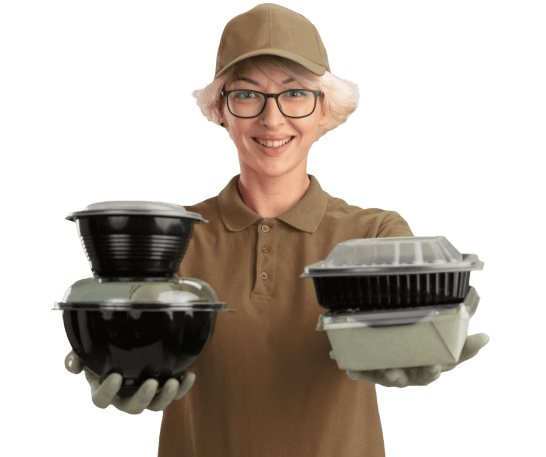Sustainability
Richfield Packaging: Where Sustainability Meets Quality. Our commitment goes beyond just delivering products. We prioritize eco-friendly practices, using high-quality materials that not only meet industry standards but also contribute to a greener future. Explore our range of sustainable packaging solutions designed to elevate your brand while ensuring the highest standards of quality. Choose Richfield for packaging that not only stands out but stands up for a better, more sustainable world.
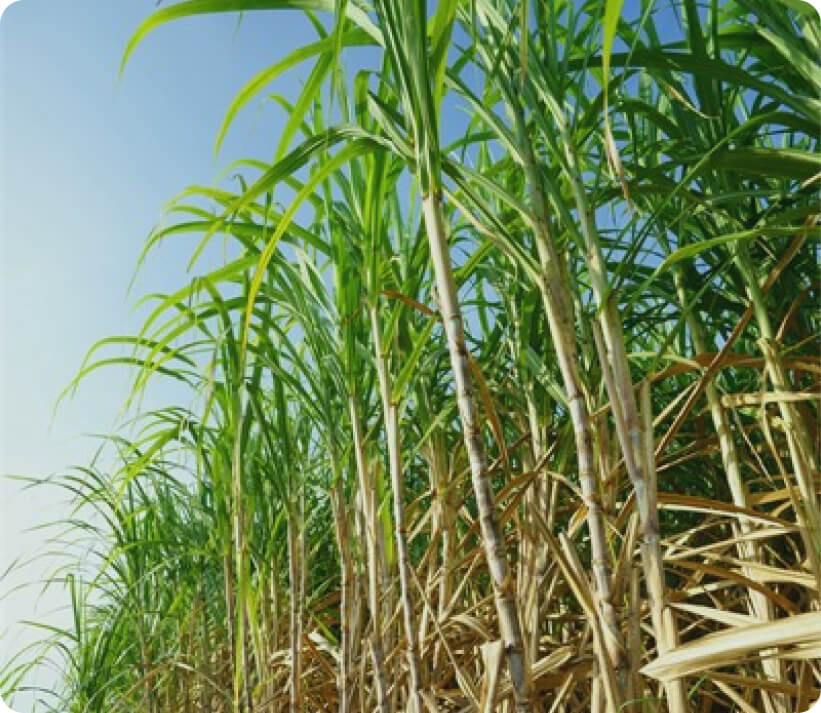
BIODEGRADABLE ITEMS (Bagasse – Sugarcane)
Derived from sugarcane residue, Bagasse undergoes a low-impact process, using less energy than traditional pulping. As a by-product, it requires no additional cultivation lands, preserving our forests.
Biodegradable Brilliance
Our 100% compostable Bagasse products decompose in just 90 days, leaving behind nutrient-rich organic compost. Not only can it be used to produce perfect food containers, it can also be used as a biofuel – a fuel source which helps battle the environmental impacts of fossil fuels.
The material has no impact on taste or aroma of food, unlike some alternative packaging which does have a distinctive smell that can affect how food tastes.
Strength in Sustainability
Richfield Packaging’s Bagasse products are sturdier and more rigid than traditional paper products. Enjoy ideal thermal properties for hot, wet, or oily foods, even microwave them for 2-3 minutes.
We respect the environment.
Explore our Bagasse collection and contribute to a sustainable future. Richfield Packaging invites you to make a difference without sacrificing quality. Join us in creating a world where innovation and eco-conscious choices go hand in hand.
Plant based
Earth friendly
Recyclable
Natural white
Hot & cold use
Freezer friendly
BIODEGRADABLE ITEMS Polylactic Acid – Plant Starch
Compostable & Biodegradable: Breaks down naturally in a commercial composting facility, leaving no lasting impact on the environment.
Choose PLA with Richfield Packaging – where innovation meets sustainability.
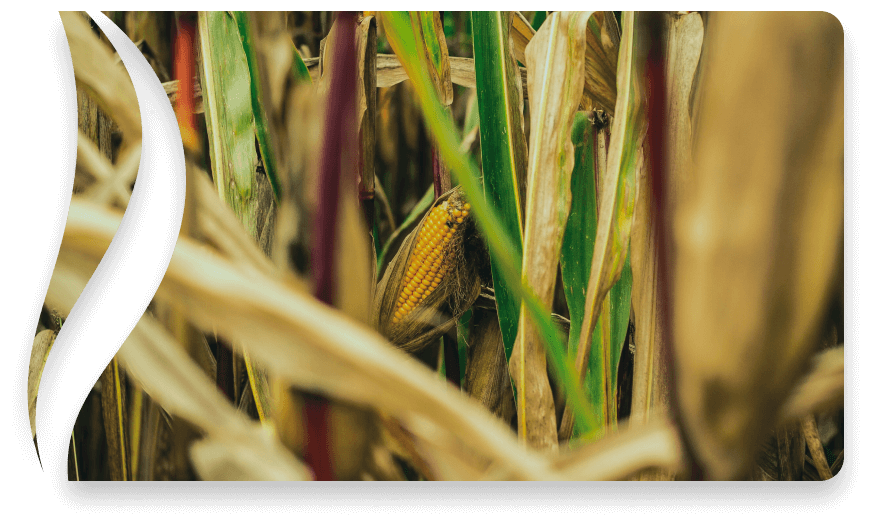
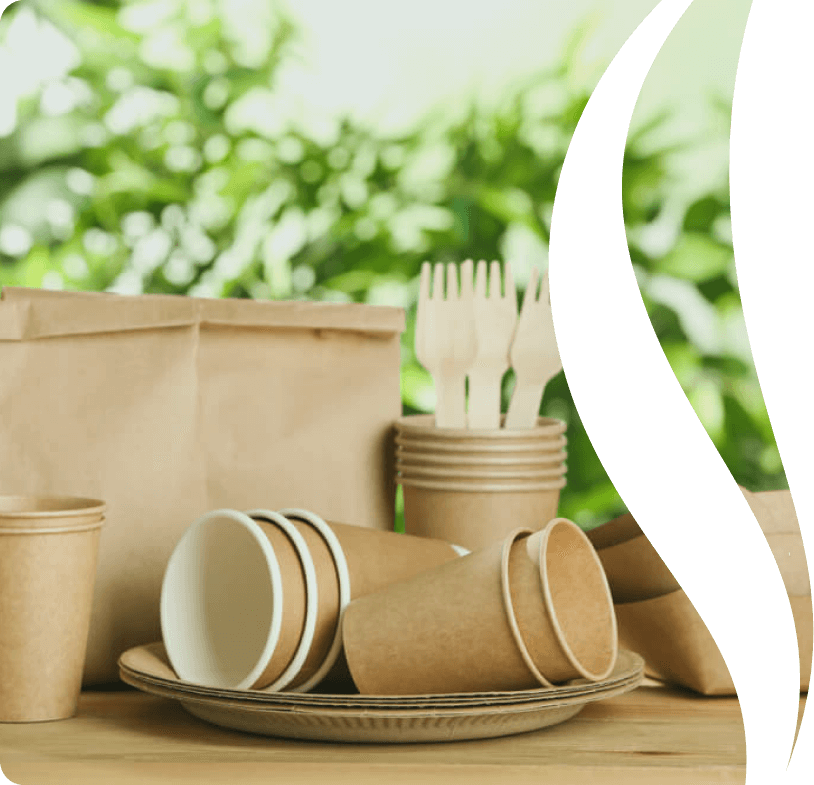
What is Compostable Packaging?
Compostable packaging is made from biodegradable, plant based materials and is capable of disintegrating into carbon dioxide, water and biomass under the right conditions. This would mean being exposed to microorganisms, humidity and high temperatures in a controlled environment. It has no negative impact on the toxicity of the soil.
Composting PLA (Polylactic Acid) :
- Disposal: Our PLA clear cups, containers, and lids should be disposed of in an industrial composting facility.
- Biodegradation: Under conditions of 60 degrees Celsius and humidity above 80%, PLA completely biodegrades, returning to its base component of lactic acid.
- Recycling: While PLA can be recycled in some regions, South Africa currently lacks dedicated recycling plants. Composting remains the most effective end-of-life option, offering benefits even in landfills compared to oil-based plastics.
Composting Bagasse :
- commercial composting facility within 45–60 days.
- Home Composting: While they will break down in a home compost bin, the duration may vary based on composting conditions.
- Choose Richfield Packaging for sustainable, compostable solutions—making a positive impact on the planet.
PAPER PRODUCTS (KRAFT)
Biodegradable Kraft Paper: Crafted from unbleached, biodegradable Kraft paper sourced from responsibly managed forests, ensuring minimal environmental impact.
Certified Sustainability: Richfield’s kraft product is Forest Stewardship Council (FSC) certified, guaranteeing that the paper comes from forests managed in an environmentally and socially responsible manner.
Versatile Applications: Suitable for various food packaging needs, including wraps, pouches, and containers, providing a sustainable alternative to traditional packaging materials.
Low Environmental Footprint: Designed with a focus on reducing overall environmental impact, including energy consumption and water usage during manufacturing.
Customizable Printing: Utilize eco-friendly inks and customizable printing options to enhance branding while maintaining an environmentally conscious approach.
Benefits :
- Consumer Appeal: Consumers increasingly prefer eco-friendly options. Richfield aligns with sustainability trends, demonstrating a commitment to environmental responsibility.
- Regulatory Compliance: Meets and exceeds regulatory standards for sustainable and biodegradable packaging, enhancing your brand’s reputation for responsible business practices.
- Corporate Social Responsibility (CSR): Showcase Richfield Products’ commitment to CSR by offering products that contribute to environmental conservation and responsible sourcing.
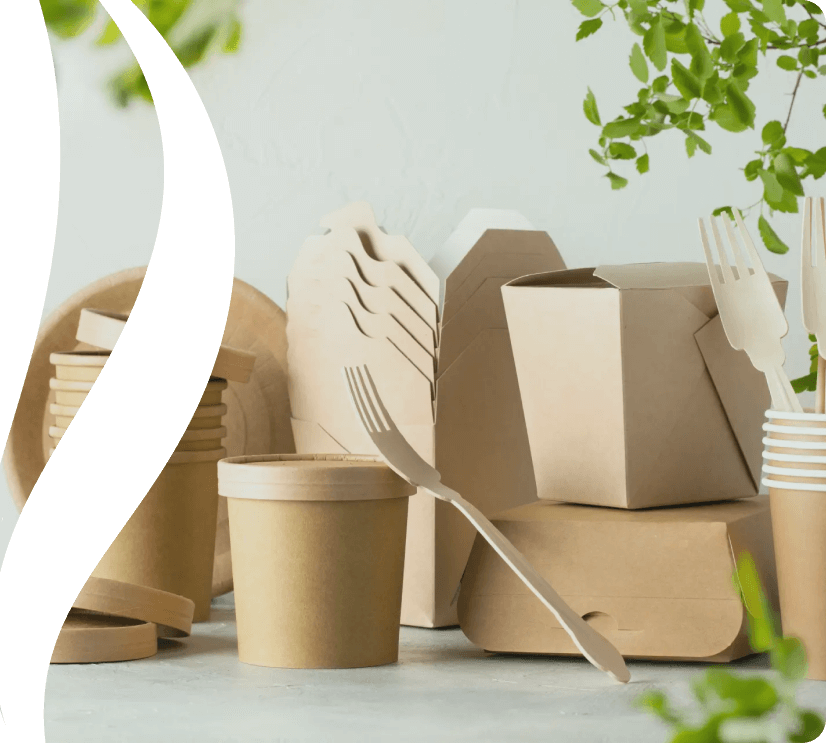
Packaging Solutions:
- Richfield Sandwich Wrappers: Ideal for delis, cafes, and quick-service restaurants looking to provide sustainable packaging for sandwiches and snacks.
- Richfield Biodegradable Pouches: Versatile and eco-friendly pouches suitable for various food items, promoting sustainability across different markets.
- Richfield Container™ Sustainable Takeout Boxes: Sturdy, environmentally friendly takeout containers perfect for restaurants and food delivery services committed to reducing their ecological footprint.
- By incorporating Kraft paper into these products and emphasizing their sustainability, Richfield Products can tap into the growing market demand for eco-friendly packaging solutions.
WOODEN ITEMS (Wood & Bamboo)
Source and Composition :
Wood :
- Typically refers to materials sourced from various types of trees. Disposable food items made from wood may include products like wooden cutlery, plates, and trays. Wood is generally heavier and denser than bamboo.
Bamboo :
- Bamboo is a type of grass, and products made from bamboo are often lightweight and durable. Bamboo is known for its rapid growth, making it a more sustainable and eco-friendly option compared to traditional wood.
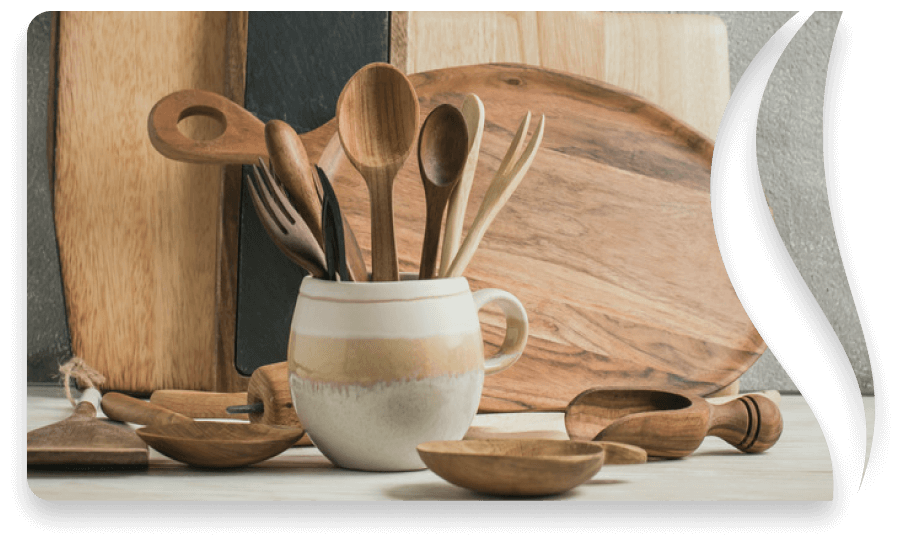
Sustainable :
- Wood: The sustainability of wood depends on the type of wood and the forestry practices involved. Some woods may be sourced from responsibly managed forests, while others may contribute to deforestation and environmental degradation.
- Bamboo: Bamboo is considered highly sustainable because it is a fast-growing plant that can be harvested without killing the plant. It requires less water and space compared to many types of trees. Bamboo is often promoted as an environmentally friendly alternative due to its renewability.
- Environmental Harmony: By choosing wood and bamboo, we strive for a balance between functionality and environmental responsibility, providing you with packaging solutions that make a positive impact.
- Richfield Packaging – where nature and innovation intertwine to create a sustainable future.
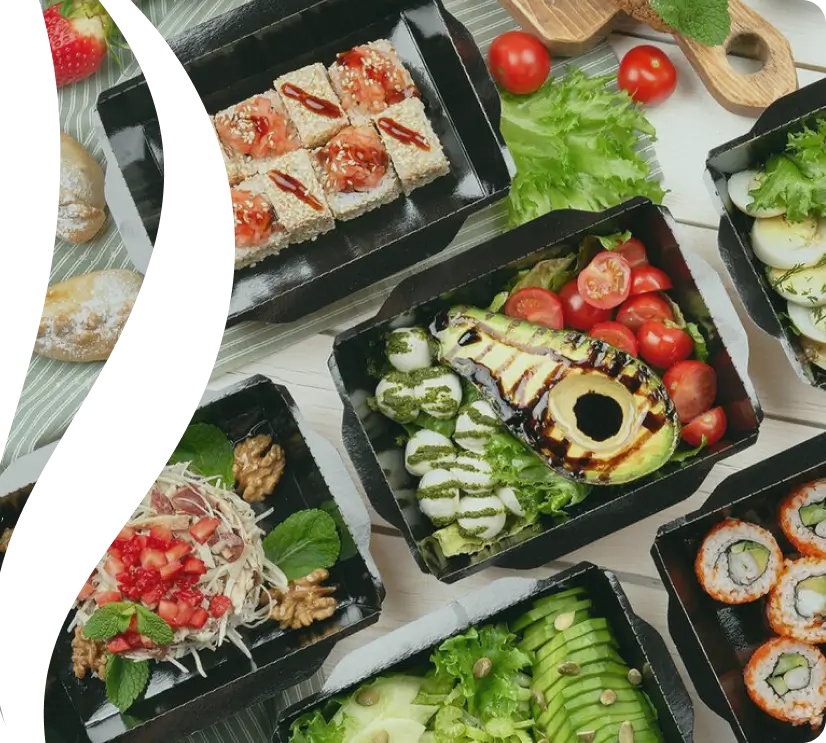
PLASTIC:
Embracing Responsible Choices: Recycled and OXO-Biodegradable Plastics
Recycled Plastics:
- Circular Economy: We proudly incorporate recycled plastics into our packaging, promoting a circular economy by giving new life to materials.
- Reduced Environmental Impact: Using recycled plastics helps reduce the demand for new raw materials and minimizes environmental impact.
OXO- Biodegradable Plastics :
- Biodegradable Solution: Our OXO-biodegradable plastics are designed to break down naturally, contributing to a more sustainable end-of-life process.
- Environmental Responsiveness: OXO-biodegradable plastics offer an environmentally responsive alternative, supporting efforts to reduce plastic waste.
At Richfield Packaging - we make conscious choices to balance functionality with environmental responsibility. Join us in making a positive impact.
Aluminum:
- Endless Recyclability: Aluminum is endlessly recyclable without compromising quality, making it a sustainable choice for packaging.
- Reduced Energy Footprint: Recycling aluminum requires significantly less energy compared to producing it from raw materials, contributing to energy conservation.
- Durable and Lightweight: Aluminum’s durability ensures the protection of your products, and its lightweight nature reduces transportation emissions.
- Choose aluminum with Richfield Packaging – a versatile, eco-friendly solution for a greener tomorrow.
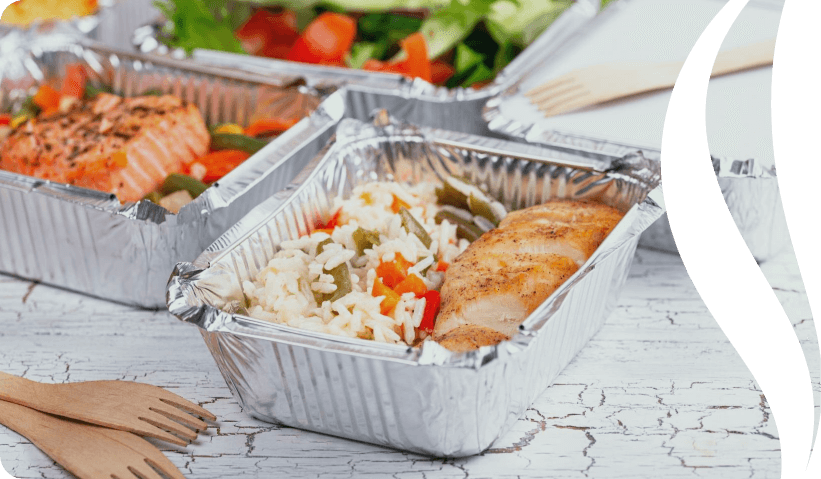

FOAM:
Expanded Polystyrene (EPS) :
- Commonly known as styrofoam, EPS is a lightweight and insulating foam material often used in packaging. While it provides excellent protection for delicate items, it is not easily biodegradable and can contribute to environmental concerns.
Biodegradable Foam :
- Companies explore environmentally friendly options that break down more easily than traditional foams.
Biodegradable Foam :
- At Richfield Packaging, we prioritize eco-friendly solutions. We focus on recyclable and sustainable alternatives, ensuring protective packaging without compromising environmental responsibility.

